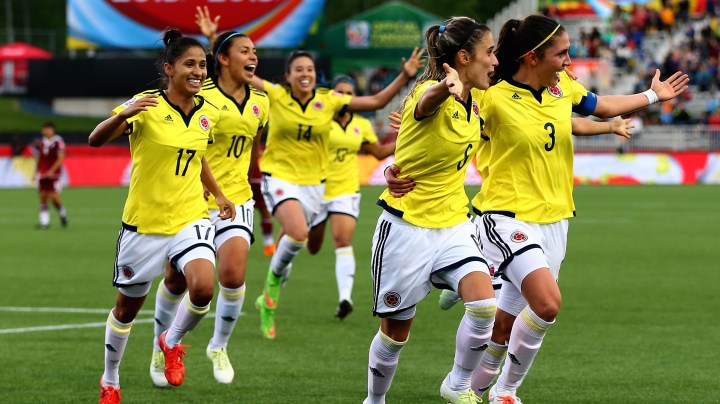Adidas’ Sexist Colombia Jersey Reveal: James for the Men, a Model for the Women

Daniela Montoya celebrates her goal with teammates in the second half against Mexico during the FIFA Women's World Cup 2015 at Moncton Stadium on June 9, 2015. Photo by Elsa/Getty Images
Seven months left until the World Cup, and soccer fever is gripping us all. Those four madcap weeks of the all-consuming beautiful game are drawing ever nearer and, from Auckland in New Zealand to Lima in Peru, it’s all down to the wire. For those already qualified, this week has brought the joyous reveals of jerseys for Russia 2018. While a PR exercise by big brands to hype the World Cup and their own products, there’s something fun about seeing the vibrant future of kits months ahead of time.
A jersey represents so much more than a piece of fabric. Who doesn’t become teary-eyed when remembering the iconic yellow jersey of Brazil’s famed 1970 team when the World Cup was first broadcast in color via an American satellite, as the bamboozling and brilliant Brazilians stormed to eternal glory and cult status dismantling Italy 4-1 in the final? Captain Carlos Alberto Torres’ wonder strike was the culmination of a Brazilian triumph and ever since the intimate relationship between a global following and the yellow jersey has blossomed, reinforced by Nike’s ingenious airport ad before the 1998 World Cup.
Of course, how a jersey is presented can also bring with it negative consequences. For Colombia’s new shirt, James Rodriguez–Bayern Munich player and talisman of Los Cafeteros–posed as the male model for the reveal. A stylish image with Rodriguez’s sharp features polishing the photo made the rounds, and all was well. However, for the female shirt, eitger the Colombian Federation or Adidas decided to hire Paulina Vega, a model and the 2014 Miss Universe, to show of the cafeteras’ new uniform. She showed off the kit instead of one Colombia’s female players, who have made great strides in their game and played at the last Women’s World Cup in 2015. Even if they hadn’t, there should be no need to explain why players should be used equally to showcase new jerseys.
For her part, Vega posted a message on social media, which read that “the new jersey of the Colombia team empowers me. Ready to support them next year in Russia.”
Unsurprisingly, the whole gimmick didn’t go down well with former players and fans, who expressed their displeasure and indignation at the simmering macho culture. Current Colombian goalie Vanessa Cordoba–who has previously spoken out about gender inequality in soccer–said it best in a series of tweets: “I understand that for publicity’s sake, they preferred to give the jersey to Paulina Vega, but in terms of respect and merit, THE PLAYERS count as well.”
Cordoba also took to her Instagram after the initial wave of controversy: